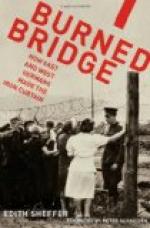That, chiefly, was what stirred him anew to action, a suddenly acute sense of failure, of a consciousness that he was drifting instead of doing. He found himself jarred out of the even tenor of his way. San Francisco filled him with dissatisfaction now, knowing that she was there. If the mere knowledge that Sophie Carr dwelt somewhere within the city boundaries had power to make a mooning idiot of him, he said to himself testily, then he had better get out, go somewhere, get down to work, be at his fixed purpose of proving his mettle upon an obdurate world, and get her out of his mind in the process. He couldn’t tune his whole existence to a sentimental craving for any woman—even such a woman as Sophie. He would, in the moment of such emotional genuflexions, have dissented with cynical bitterness from the poetic dictum that it was better to have loved and lost than never to have loved at all.
Spurred by this mood he acted instinctively rather than with reasoned purpose. He gave up his room, packed his clothes and betook himself upon a work-seeking pilgrimage among the small, interior towns.
He left San Francisco in March. By May he had circulated all through the lower San Joaquin and farther abroad to the San Juan, and had turned his face again toward San Francisco Bay. At various jobs he had tried his hand, making a living such as it was, acquiring in addition thereto a store of first-hand experience in the social and monetary values of itinerant labor. He conceded that such experience might somehow be of use to a man. But he had had enough of it. He had a feeling of having tested California for his purposes—and of finding it wanting.
He had made up his mind to double on his tracks, to go north again, specifically to British Columbia, partly because Tommy was there, chiefly because Vancouver was a growing place on the edge of a vast, newly opened interior. He knew that if no greater thing offered, from that center there was always the avenue of the woods. He could qualify in that line. And in the woods even a common axeman exacted and received more democratic treatment than in this older region where industry ran in fixed channels, where class lines were more rigidly drawn, where common labor was cheap and unprivileged.
He hadn’t been getting on in those three months. He had less money than when he started out—about enough now to get him up North and leave a hundred dollars or so for emergencies. No, decidedly he wasn’t getting on—he was going down, he told himself. It dismayed him a little. It wasn’t enough to be big and strong and willing. A mule could be that. The race was not to the swift or the strong. Not in modern industry, with its bewildering complexities. No, it fell to the trained, the specialist in knowledge, the man who could do something more efficiently, with greater precision than his fellows.
He could not do that—not yet. And so there was nothing in California for him, he decided. A man could no longer go West and grow up with the country—but he could go North.




